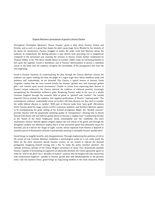Explore Marlowe’s presentation of greed in Doctor Faustus
Throughout Christopher Marlowe’s ‘Doctor Faustus’, greed is what drives Faustus’ foolery and
frivolity, and as such, it is greed that shapes the play’s quasi-tragic form. Blinded by the intensity of
his desire for omniscience, Faustus struggles to realise the wider truth that Marlowe allows the
audience to comprehend: the fleeting pleasure a man derives from practising evil is insignificant
compared to the permanent joys awaiting the virtuous in heaven. Greed, further condemned by
Thomas Dekker in his ‘The Seven Deadly Sinnes of London’ (1606), reaps no everlasting benefit, in
fact, quite the opposite. Greed is damnation, and in Faustus’ determination to pursue a reprobate
course to the bitter end, the audience recognise the inevitability of the protagonist’s fate from the
very beginning..
Greed is Faustus’ hamartia. In contextualising the play through the Chorus, Marlowe ensures the
audience can expect nothing less than the plight of a rogue tragic hero whose rebellious pride and
ambition will, undoubtedly, be his downfall. The Chorus, a typical feature of Ancient Greek
Tragedies, confess that the once revered scholar has become “glutted now with learning’s golden
gifts”, and “surfeits upon cursed necromancy.” Unable to refrain from expressing their distaste at
Faustus’ newest endeavour, the Chorus subverts the tradition of unbiased passivity, knowingly
manipulating the Elizabethan audience’s piety. Rendering Faustus sinful in the eyes of a wholly
Christian England through the semantic field of greed in “glutted” and “surfeits”, the usually
impartial Chorus prompt the audience into negative predications of Faustus’ “aspiring pride.” The
contemporary audience, undoubtedly aware of Lucifer’s fall from Heaven, are thus lead to consider
the subtle biblical allusion in “golden”. With part of Heaven made from “pure gold” (Revelation
21:21), Faustus greed for magic echoes Lucifer’s avaricious ambition, and therefore Marlowe appears
to be foreshadowing the grisly ending of his ill-fated protagonist. Magic, the “devilish exercise”,
provides Faustus with the perpetually satisfying quality of “omnipotence”, allowing him to detach
himself from divine will and fulfil his greedy desire to become a “mighty God.” Condemning divinity
as the “basest of the three/ Unpleasant, harsh, contemptible and vile” establishes this naive
resoluteness. Faustus’ diatribe against religion exposes the true extent of his greed, and through the
derogatory syndetic list, Marlowe’s implies that it is this narcissistic greed that ultimately causes his
downfall, just as it did for the ‘Angel of Light’, Lucifer, whose expulsion from Heaven is depicted in
countless pieces of Renaissance artwork (coincidentally seeming to exemplify Faustus’ parallel fate!).
Greed brings no tangible benefits, only disappointment. Through emphasising the pettiness of evil in
the scenes of Low Comedy, Marlowe establishes a psychological truth: sin is not really worth the
effort. As the stock characters parody Faustus’ avarice, we are invited to ridicule the damned
protagonist. Imagining himself turning into a flea “to tickle the pretty wenches’ plackets”, the
robustly lecherous attitude of the Clown Wagner encounters in Scene Two, dramatically parallels
Faustus. Capable of formulating an argument yet physically destitute, the Clown ignorantly agrees to
trade his “soul to the devil” for a “shoulder of mutton”, unaware that his bargain will only reward him
with insubstantial fripperies - parallel to Faustus’ greedy deal with Mephistopheles in the previous
scene. Like the insolent Clown, greed brings no long lasting benefits to the stock characters, Robin





